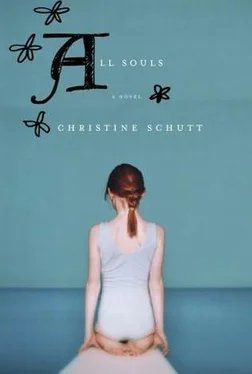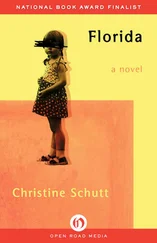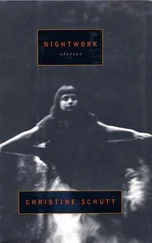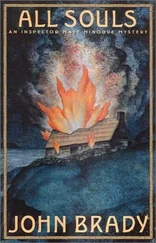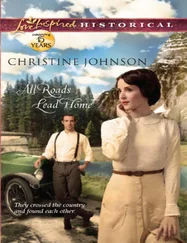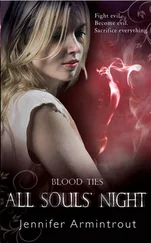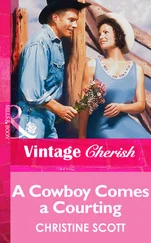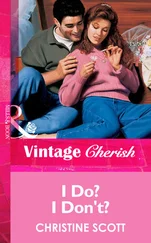He said, "Why don't you come over?" And when she didn't answer, he said, "Take a taxi. I'm not really as far as you think."
She didn't know where to sit once she was in his apartment. The couch was serving as a table; stacks of magazines and newspapers and books took up its length, and the chair under a reading lamp was clearly Tim's, so that the only other possible chair was the beanbag in the corner. "From somebody's youth," he said, "probably mine."
She moved around the room. She looked at the books on his shelves: biographies — Ernest Hemingway, Adlai Stevenson, Frank Lloyd Wright — and in a cleared space a picture of a dour little girl and another picture of her, younger by years, smiling on a lawn in a skirted bathing suit. "My niece. My sister's children. They live with the folks in Ohio. The little boy's name is Ted. He's six, I think, or he may be seven." The little boy was cuter than his sister, freckled, a little like Tim. "He looks like you," she said.
"I'm flattered," he said. "I'm glad. I've got beer and beer. What would you like?"
"Nothing."
"Really?"
But she joined him in a beer, clinking bottles as he moved his chair closer to the couch, remarking that they had more than Siddons in common; they were both from the Midwest. Yes, he said. He knew that, and Tim was glad she had called, had come; he had been wondering about her visit to Astra Dell.
"Yes," she said.
"So?"
"The girl slept the whole time. She opened her eyes when I first got there, and she may have seen me. I don't know. The nurse said she would tell Astra I'd been there." Anna drank and shrugged her shoulders, said she was tired. She said, "So," said, "Nothing much to say except I'm depressed."
He took the beer from her hand and kept her hand in his and looked at her in that Tim Weeks way he had, and he was adorable again.
She said, "Well, I'm not suffering, am I? I came here, didn't I? I'm sitting with you and drinking beer and playing the sad sack when what do I have to be sad about?"
"Don't be so hard on yourself. You have reason to be sad. There's something wrong about a child gravely ill. There's the memory of your brother."
"You think they could fix it by now. You think they'd know more."
"Next time maybe I should go with you," and he let go of her hand.
"I'm not being hard on myself. I was glad for an excuse to call you."
He smiled. He talked about quiet experiences and how it helped to see a lot of foliage from the windows of his apartment. "Look," he said, and she did, and she saw the leaves on the cherry trees were small and ovate and a yellow-red that looked edible.
"I like where you live."
CHF
By the time Car got to the hospital, visiting hours were almost over, but Astra was awake, and when the girls saw each other, they cried. Astra was hooked to ma chinery and fenced off behind a castered table, so that Car stood aloof and cried. The words for what they were feeling were ordinary, familiar words, and Car was sorry to say them. Even the language behind her silence was worn and uninspired and whapped the way balloons did without surprise or weight. And what had she brought to show Astra? Old photos, the colors too bright; the beach, a hurtful white against the blue of everything else. Astra in a tented costume and Car in a bathing suit, and both of them laughing at Car's father, who had taken pictures then. The girls eating lobster. Car asleep in the hammock. The girls older and eating lobster. Sweet peas whimsically tangled on tepeed trellises, and hydrangeas, so heavy headed from a rain, they flopped on the lawn as if playing dead. Pictures of the front of the house swept and raked. Thor, more of Thor, this time with his bone. Kayaks far out in the bay. "That's us," Car said. "Remember? That was the same day we saw Will Bliss and met his friend from Taft. Remember?" Astra remembered. There had been a party on the beach, a bonfire. Astra said, "Will Bliss, just the name. You have to love him. Besides, what's wrong with looking cute all the time and being the favorite friend of little children?"
Car smiled. "What was that song those boys were singing?"
What was it? But Car didn't remember what it was or what she was going to say next, and she opened the present she had brought for Astra while Astra watched: a bracelet, light as the cotton it was swaddled in, from Cartier, thin as a string, a silver bracelet beaded with silver beads. Astra's mouth opened in a kind of smile, her tears looked milky, and Car was ashamed to look at Astra and turned her attention to the upright row of cards.
"All your cards!" Car said. "This one," and she opened and read and put it behind another card. "Lisa Van de Ven has the neatest, fattest handwriting. 'Dear Astra… at least you're escaping Mr. O'Brien's first-period Monday class… ugh. I'm sure you're happy about that. And you'll be able to catch up on the sleep…' Lisa is such a bore." Car took up another and read aloud: "'Remember the chorus trip when we stayed up all night and talked about EVERYTHING!!!?' Who is this from? Edie, I should have known. And Alex of AlexandSuki, what did they have to say? I miss you a lot, and I know so many people have said that to you, but I know that you know that coming from me…' Alex is so crazy. You know she's making a video about the senior experience? She thinks it'll look good on her applications." The rest of the cards Car read to herself, and when she turned back to Astra, her best friend's eyes were shut. They were shut and her face settled in a way more final than before, and Car knew she was asleep. Someone rapped at the door; visiting hours were over; it was time. True enough, the room had darkened. The corridor, too, was asleep, and the nurses' station empty, and the doors along the hall were half shut on screened-off beds, and nowhere was there music or TV, only the nurse on spongy soles, moving just ahead, checking on the darkness from room to room, saying to Car as they walked down the corridor, "She's looking pretty good, your friend."
"Was that good?" and when the nurse didn't answer right away, Car said that maybe she could come tomorrow. Maybe, yes, she should come. Tomorrow. Tomorrow was school again. Folio meeting. She had AP calculus to do. No frees tomorrow except lunch. No lunch tomorrow. Tomorrow no food, nothing, only water.
Siddons
Edie Cohen explained right speech involved abstinence from "lying, telling tales, harsh language, and frivolous talk." In the first skit at morning meeting, three girls were talking, and as a fourth approached, one girl said to the others, "Don't let her join our group." In the second skit, four girls were talking and after one of them had left, the others spoke behind her back: "She is a drag. I wish she wouldn't follow us."
In the third skit, four girls were talking and then one of them walked to a pile of book bags and took something that was clearly not hers. When later she had the opportunity to confess, she lied: "I didn't take anything."
Marlene played the student who said, "Don't let her join our group," a line she had heard: Lisa Van de Ven, eighth grade, middle school. The jittery disconnect and suddenness of middle school: breasts and stinks. Rumors, boys, dances. The boys froze some fatty's bra and waved it like a flag in Frost Valley.
Unattached
Anna Mazur did not like Tim Weeks's apartment as much as she liked her own. Hers had a view of the East River. Every time she opened the front door to her apartment, she walked toward the restlessness, the choppy, mostly dun-colored or black shivering river as seen from the picture window, a view that powerfully affirmed the rightness of her relocation from Michigan. Hers was a postwar building, and the windows were modern with wide panes — she needed to get them washed — and the rent for her apartment was a matter of its view and the floor, the twelfth floor, a junior one-bedroom, which meant not quite a studio, not quite a one-bedroom, but five hundred square feet of living space for a large chunk of what she made every month. Her mother had asked more than once, "How much can you save living in a city like New York?" Money for Anna, at age twenty-eight, was not the point; she had wanted sophistication and experience. The private school in Michigan where she first taught had a B reputation, or so said her cousin, the lawyer — and who better than the lawyer to know? In Anna's eighth-grade classroom at Siddons, early in the teaching year, she had one day come into class and started the lessons — always, always, she forgot to take roll — while two of her students hid under her desk. They would have seen the entire class through from this perspective except that their delight in the prank, and their classmates' laughter, gave them away. Other missteps included her constantly confusing the names of two black girls—"Do we all look alike, Miss Mazur?" The problem was the girls did look alike.
Читать дальше
